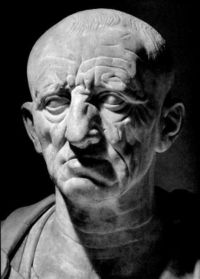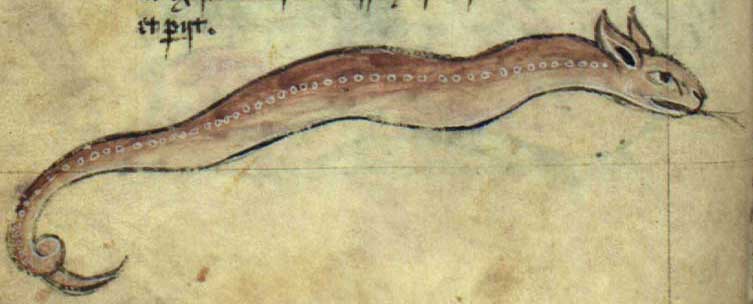The last two and a half books of Civil War, while seemingly adrift and lacking the cumulative direction of the first seven, don’t make me think any less of the epic as a whole. Lucan’s talent was an emergent one: he was not about to construct a work of pristine beauty and organization. Any unity to the work would come out of the chaos that he was wrangling into magnificent and grotesque forms.
The artistic cost of dealing in such chaos is great, and while it’s frequently the poets who get the greatest acclaim for it (I’m thinking of Rimbaud), working with it in lengthy form and not having the entire mass collapse is in my mind a greater achievement. Melville’s two most psychotic books, Moby-Dick and Pierre, both throw aside almost all restrictive reins placed on their narratives and characters. Both engage in a digressive and barely controlled narrative style reminiscent of Lucan’s staccato jerks from one scene to the next. Interpolated tales like Moby-Dick’s “The Town-ho’s Story” serve a very non-picaresque purpose in such works.
In the 20th century, Catch-22 and the early works of Celine also pitch similar wrestling matches between disintegrating forms and visceral narrative force. Characters melt together. The threats of the past and the future blur the present moment. The plot is not a line, but a tree on which are hung different shapes and ornaments. For contrast, Pynchon’s works never let go in such an uncontrolled way. Pynchon’s starting point is always that of artifice, and so reality ends up peeking through his gaudy slats meekly, rather than rising up in force against the writer’s struggle to organize the material.
While the Roman Empire survived beyond what to Lucan must have looked like a terminal point of bad governance and corruption, epic poetry pretty much didn’t. Statius wrote his estimable Thebaid shortly after Lucan, but it is a retrenching in Greek mythology, albeit with a Lucan-esque darkness and bloodiness added. Silius wrote a very long and boring historical epic about Hannibal and the Punic Wars that has none of Lucan’s virtues. And while there are later works like Nonnus’s ridiculously long Dionysiaca, Dante is comfortable enough sticking to Virgil, Ovid, Lucan, and Statius in invoking his predecessors at the beginning of the Inferno.
So I see Lucan as really sounding the death of the classical epic and its nationalistic and preservationist ideals, ridiculously soon after Virgil had revivified them artificially. Virgil is probably the greater artist, the greater poet, but in their arguments and their representations of the world, I think Lucan stands toe to toe with Virgil.
Lucan’s point of view was a privileged one. The paradox is that he was simultaneously in a position of immense good fortune as well as great danger, and he apparently engaged with this position impetuously. James Zetzel makes a point about just how atypical Lucan’s circumstances were:
Roman writers are, and write for, an elite. Their perspective, above all that of a writer like Lucan, is extraordinarily narrow and self-serving. To invent a universal Post-Traumatic Stress Disorder on the basis of what a Lucan felt or believed is neither good history nor good criticism–and it is also, quite evidently, deeply imbued with late twentieth-century preconceptions that would have left most Romans puzzled or revolted.
In the history of literature this is hardly unusual. Most pre-modern literary works were created within the context of some elite establishment, either out of patronage or for privileged audiences. The Aeneid is an extreme example. But it’s worth remembering that Lucan had unusual access to both power and information, and that he was exceptionally close to an unstable and inept ruler. Waves of force were emanating from a very close source while leaving him untouched, at least for a while.
But to read Lucan while being in the first world at this point in history is to be in something of an analogous position. Lucan does not and did not feel for all of the Roman people, but he did have a sense of how anonymous populations are swept up mercilessly into uncontrolled historical events. Now that we have the scientific and communications tools to track those phenomena, we first-world newsreaders get the actual accounts of Fortune’s caprices and its agents every day. It makes the Aeneid seem a little quaint, or at least more suitable to subversive readings than to enthusiastic fist-pumping for Rome. But Lucan, in his refusal to represent history and warfare as the human and the emotional, speaks in the dissociated machine-gun language of contemporary reportage.
In se magna ruunt: laetis hunc numina rebus
crescendi posuere modum.

